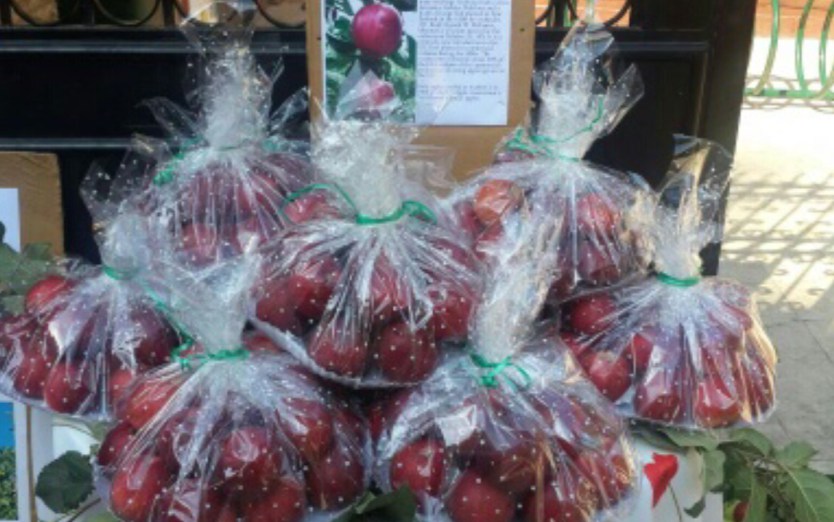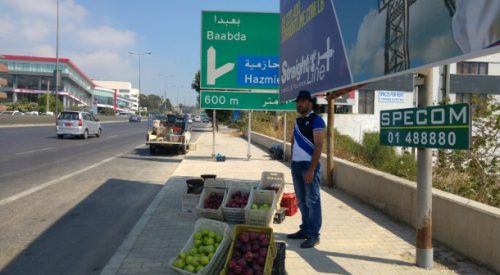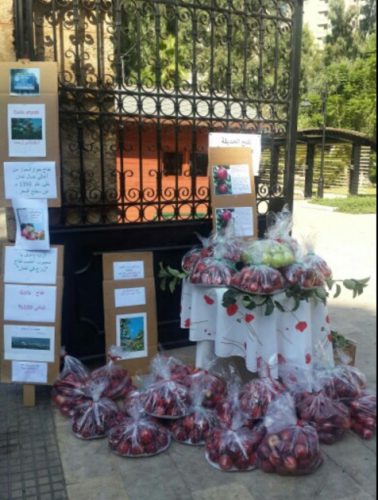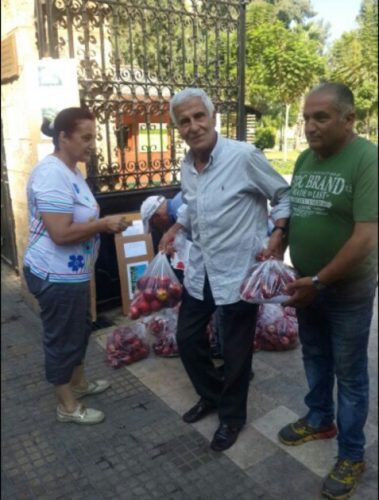Nearly all production sectors in Lebanon, and particularly agricultural ones are facing several problems. Perhaps the deterioration of agricultural land tops them, knowing that it results from climate change, which contributes to soil’s destruction and the spread of diseases. However, the most important problem that threatens this sector’s fate, was and is still represented in selling the produce; it worsened with the ongoing war in Syria, in addition to the criteria adopted by the Gulf States (regarding the selection of products), which prevented the possibility of selling Lebanese products, and especially apples.
Unfortunately, these problems are met by the Lebanese government’s absence and lack of support for the production sector, in terms of fertilizers’ rationalization and provision, for example. What contributed to the aggravation of the crisis, is bombarding the markets with imported and smuggled products (this is what’s currently happening),which led farmers to fight for their rights, that have been neglected since the seventies of the last century.
From the farmer to the consumer
Journalist Samar Maalouf and “Al Mada” radio station came up with an initiative to help sell the apples. “Lebanese Apples Day” aimed at selling apples from the Lebanese farmer directly to the consumer, ie, without intermediaries. This has been a beautiful event last Saturday, especially that several locations were set in coordination with the Internal Security forces (ISF), the Governorates of Mount Lebanon and Beirut. Apples were being sold at prices ranging from 1,000 to 2,000 Lebanese Liras.
Al-Moghrabi: Shall we plant cannabis?
“Greenarea.me” met the farmer Ramzi Najib al-Moghrabi near Al-Sayyad round about, where he was displaying his products. Al-Mograbi is from Kfar Silwan area (Metn), which is famous for the quality of its agricultural products, particularly apples. The farmer sadly told us: “We ask all officials and those in charge of selling apples, to follow up on this issue with good intentions, because we can no longer bare the possibility of additional losses,” adding “We ask political leaders to pay attention to poor people, and to remember that we are the ones to elect them”.
Al-Moghrabi added: “If 5% of the passing cars stopped to buy apples, we would sell all the apples before noon, but unfortunately, when someone gets out of the car to buy from us, he/she demands lowering the price, knowing that these people buy apples for any price from the supermarket.”
The farmer also told us: “The types of apples I’m displaying today are “Top Red”, “Double Red” and “Golden”,” adding “there are other types that we will begin picking after about 10 days, knowing that we have nearly 1,500 apple trees”.
He talked about other types of suffering, mentioning that traders would not buy apples at the same price that they bought them last year (they bought apples at a good price, kept them in refrigerators, and sold them at low prices).
The farmer expected this problem to affect the prices this year. The price of an apple box weighing 18-20 kilograms is expected to be below 10 thousand LBP (this price cannot refund the cost of plowing, trimming, pesticides, fertilizers, and storage). If the Lebanese government did not pay attention to the apple season this year, there will be a disaster, because all farmers, without exception, have to pay bank loans. Added to that, if the produce remained in refrigerators, and was not sold, “the farmers do not know what they should do,” according to Al-Moghrabi.
He added: “People buy a kilo of imported apples from the market for 4000 and 5000 LBPS. After visiting one of the ministers, we pitied him, rather feeling pity for our destiny. The minister asked us to think of growing other plants, and instead of helping us, he asked us to help him. What shall we plant instead of apples? Cannabis? That is why we ask Walid Joumblatt, Samir Geagea, Michel Aoun, Saad Hariri, and Nabih Berri to help us”.
The farmer continued: “Just as Nabih Berri committed to making sure tobacco farmers sell their produce, he should help us sell our products as well. Who should help us in overcoming this crisis if those who call themselves leaders did not help us? We have one of the finest apple types in Lebanon, and the market is full of apples from other countries, especially Syria. So, how will we sell our products over the next two weeks? “.
Al- Moghrabi thanked the media, including “greenarea.info”, “Al- Mada” radio station, and “Al-Jadeed” for following-up on the apple farmers’ cause, hoping that the “Lebanese Apple Day” will not be limited to one occasion aiming at selling Lebanese products, but that there would be a week each month to help Lebanese farmers. He mentioned that “the only beneficiary is the retail dealer, while wholesaler dealers might benefit for a year, and lose for many other years”, adding that “the farmer takes care of the trees for seven months, but does not earn the value of his/her effort”.
He said: ” I sell the kilo for 1,500 LBPs, while the retail shop sells it for double the price. There are school fees we have to pay, diesel, etc… So how should we continue? A day per year is not enough”.
Al-Moghrabi concluded by saying:” No matter how much we talk, anyone who wants to take the initiative to help us, will do it, but that who does not want to help us won’t, even if he heard us for a million years. I remind you that just as we confirmed our role in the municipal elections, we can do the same in the parliamentary elections. ”
University professor and farmer
On the other hand, the farmer Rita Ayoub, displayed her finest products of “Gala” apples in front of “Sanayeh”. In an interview with our website, she said: “I am a university professor, but I have inherited the family’s business; we produce groves of cherry and types of apples such as “Gala”, “Golden” and “Starkin”,” adding “Over the last ten years, we have grown new types of apples, including: Double Red, Scarlet, and Granny Smith (which suits diabetics being less sweet). We try to use long-term pesticides, so that crops are more Eco-friendly, hoping that we would find “environmental” pesticides, to fight pests in the healthiest and best way. ”
Ayoub also talked to us about alternative crops,by saying: “We do not think of alternative crops, because they require long periods of time (more than 15 years). Added to that, we could have the same problem in terms of selling our products”. She also mentioned that chestnuts, for example, did not work as expected”.
Ayoub learned about “Lebanese Apple Day” through Facebook, so she contacted the organizers and thanked them. It saddened her that this day did not have its share on the media as it should have; There isn’t a very high demand today, but as soon as we were informed about the event yesterday, we packaged the apples beautifully. ”
The farmer told us: “We sell the kilo at a price of 750 LBPs, and it reaches 1000 or 1150 LBPs for the “Gala” apple dealer, while its price for the consumer reaches 3,500 LBPs. She also expressed her fears for the rest of the existing produce (which is still on the trees), especially since there is news that the price per apple box might not exceed 8,000 LBPs. She said: “First of all, we should contribute as Lebanese citizens in helping Lebanese production and purchasing Lebanese products (including Lebanese apples). We should also organize a harvest campaign, involving children in camps to support farms, so that children learn how to love”, adding “Why don’t we try to contribute in making good memories for children, just as the ones we had?…” “Going to the orchard was a burden for us, especially that we had to wake up very early… but now it has become a beautiful memory”.
Ayoub said: “We are performing a job that usually men do, but we are doing it in our own way as women. There is a slight difference in the way we practice our job, and this reflects on us with more hope, success, and continuity… This enhances our feeling of belonging to our land.” .
Faced with this reality, we must ask: Who is putting the crop calendar, and importing agricultural products depending on the market and the availability of products in it? Why isn’t the Lebanese farmer the priority, especially in terms of selling his/her produce?… And until when should the Lebanese farmer wait for supporting his products (apples) that are considered a symbol of Lebanon?
Instead of driving farmers to stay in their land, by putting policies that would encourage and support them, there are other types of policies; those which form a big burden on the farmers’ shoulders. All the above mentioned questions from farmers to Lebanese officials wait for answers… rather than empty promises!














